What image do you think of ‘library’? Maybe a student who has a nosebleed surrounded by thick books? Jeonju is putting effort to completely change this image into a friendly and comfortable one.
Recently, Jeonju City has been focusing on cultural projects with the motto of "the city of books." In ‘Kkotsim’ municipal library, which was established in December last year, there is a space, called ‘OOZORO1216’, designed only for the twin generation (age 12 to 16). Also, in the city hall that seemed solemn and uncomfortable, a library was built at the lobby where anyone can freely come and go. In more than one hundred large and small libraries, they invite famous authors and experts to host various cultural programs. In addition, Jeonju Reading Festival, a nationwide event that began in 2017, celebrates the fourth anniversary this year. As Jeonju City is changing into a city of books, more and more travelers even visit Jeonju only to look around the independent bookstores.
Fall is a wonderful season to read books. But for those who do not know where to buy and read books, this article introduces the special spaces in Jeonju.
Space of Two Birds with One Stone: Geonji forest small library
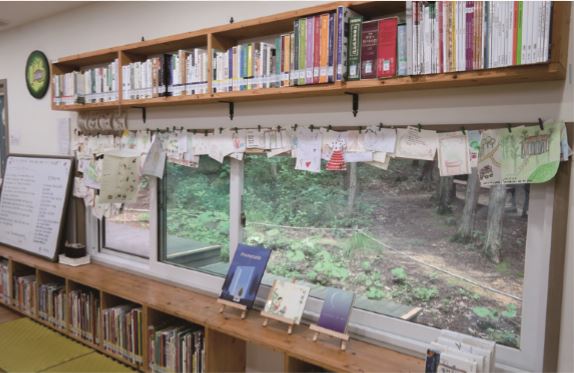
‘Geonji forest small library’ is a forest welfare facility to protect the forest environment and promote the functions of forests. The library, which was established in 2013, is managed by Wansan Municipal Library and supported by Jeonbuk National University Hospital and Jeonju City. As the library is located in the forest, it can be difficult to find the exact location on the map. Here is a tip. First, find JBNU residence hall called ‘Hyemin-kwan’, and the tennis court located right next to it. Go straight between the two places for about five minutes and you will arrive. Surrounded by cypress, it is a small space with two tables that can seat up to ten people. There are more than thousand books of various genres such as novels to children, ecology, and magazines.
This library has several features. First, the windows are entirely whole glass, so you can read while looking at the forest. Secondly, book lending is impossible. Instead, if you want to read books outside the library, you can get permission from the librarian and read them while breathing in phytoncide on a nearby bench. Currently, it is canceled due to COVID-19, but it also hosts a movie twice a year, and offers an ecological lecture inviting a forest expert. Finally, the librarian asked for the following. “In order to maintain this library, the cypress forest must be well preserved. Please be warm-hearted altogether, caring about our environment for the future.”
(Information)
Location : 20, Geonji-ro, Deokjin-gu, Jeonju-si, Jeollabuk-do
Operating Hours : 9:00 ~ 18:00 / weekend 9:00 ~ 17:00
Contact : 063) 714-2812
Website : https://lib.jeonju.go.kr/index.jeonju
Pillars of Erudition and Communication: Jeonju City Hall Chaekgidung Library.
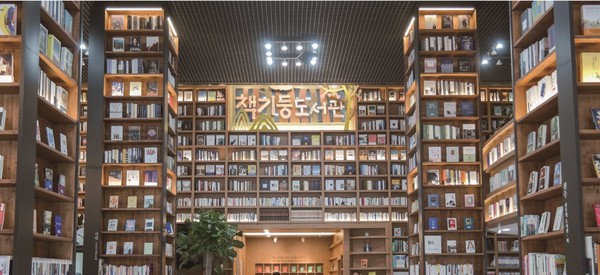
Libraries and City Halls are considered as a hard place to access. However, Chaekgidung Library proved these stereotypes can be broken through an open library where talking and reading are both allowed.
Chaek means ‘book’ and gidung means ‘pillar’ in Korean. As we can notice from the name, the characteristics of this library are four pillars that you can see at a glance. These four pillars, which serve as the leverage of Jeonju City Hall, represent that the books can be pillars of humanities in our lives. They also represent the reading ecosystem: Municipal Libraries, Publishers, Citizens, and Bookstores. Reading ecosystem means that communities, libraries, and bookstores develop habits and attitudes to read books on one fence to form a reading culture. The four walls are all filled with books categorized by its concept: Local guides, poems, fairy tales, etc. Another characteristic of this library is a cafe. Dream & Café, located in the corner of the library, brings out the most comfortable, yet fresh atmosphere you can get from a library. The library also plans to screen independent films through an enormous screen installed on the wall in near future. Due to the friendly environment, the librarian strongly recommended to have reading discussions or visit with other family members. A small park called Nosong Gwangjang in front of the City Hall also plays a part in this area. Picnics with books on the grass seem perfectly fine this autumn.
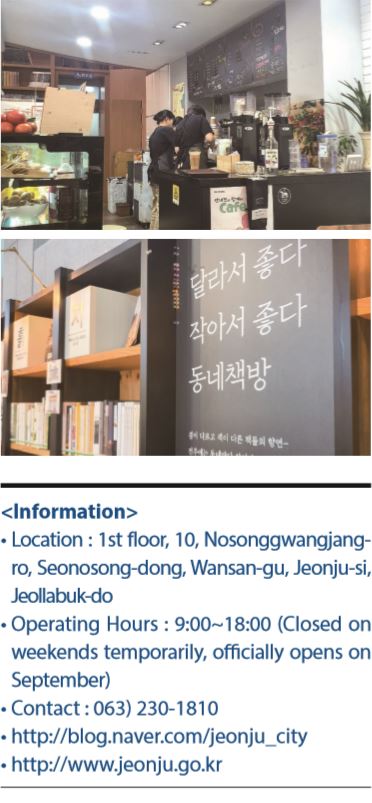
You can visit the 1.5th floor filled with books from independent bookstores and tables with chairs to read at a quieter place. On the way, you can also check lectures being held on this place or other independent bookstores that are partnered with Jeonju City Hall. More information about workshops and lectures can be found either on the website below.
Since the construction was completed in May this year and started using it from June, book lending isn't available yet, but they plan to operate the system later. Why don't you find the pillar of your life in the Chaekgidung library this fall?
(Information)
Location : 1st floor, 10, Nosonggwangjang-ro, Seonosong-dong, Wansan-gu, Jeonju-si, Jeollabuk-do
Operating Hours : 9:00~18:00 (Closed on every weekends, temporary)
Contact : 063) 230-1810
Website: http://blog.naver.com/jeonju_city/ and http://www.jeonju.go.kr/
Meet Intangible Cultural Heritages in Just One Place: Larchiveum
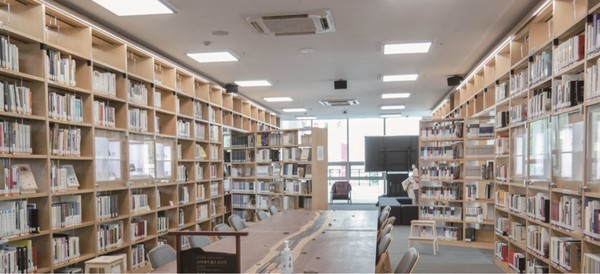
Larchiveum performs the function of the library, archives, and museum. The term was initially offered in 2008, when Megan Winget aimed to bring up a multidisciplinary institution within her information science research. The fourth industrial revolution brought up the necessity for the new method of archiving a heritage, which became possible as digitalized data were adopted easily. In Jeonju, Chaekmaru Larchiveum is widely open to citizens, providing various information via different kinds of media.
Located in NIHC (National Intangible Heritage Center) near Hanok Village, it is quite a small place compared to the main municipal libraries in Jeonju. Nevertheless, the larchiveum has its characteristic that it possesses various kinds of visual and audio media including donated books related to intangible cultural heritage. The archives and intangible cultural heritages are transformed into citizen-friendly materials after they were opened to the public in 2018. If imaging a library full of novels, poems, and essays, it is totally a wrong prediction. Mostly, specialized publications of heritages, and specified data of NIHC are arranged together in order to help the better understanding of unfamiliar subjects.
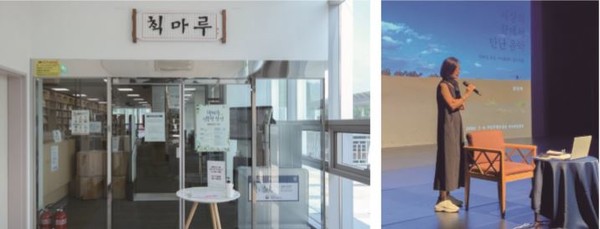
Several lectures are occasionally held in this place. In most cases, the lecturers are especially experts in the intangible cultural heritage field. This summer, due to the spread of COVID-19, the lectures were held in a small auditorium in NIHC to keep social distance between audiences. The Globe reporters have participated in this program and had a meaningful yet enjoyable time. There were various cultural themes, such as “traditional alcohol beverages”, “traveling with indigenous music”, “Korean style architecture: hanok”, and more. The lecturers gave the audience diversified and interesting information from their great storage of knowledge. It was more fascinating to learn the common themes by the explanation of intangible cultural heritage.
(Information)
Location : 95, Seohak-ro, Wansan-gu, Jeonju-si, Jeollabuk-do
Operating Hours : 10:00 ~ 18:00 (closed on national holidays)
Contact : 063) 280-1578
Website : www.library.nihc.go.kr
Independent Book Stores
Independent bookstore refers to the place where a bookseller does not rely on the large distribution system of books, being independent from the capital, and operates a small bookstore which reflects their own characteristics. Occasionally cultural events such as special lectures, discussions, and other various programs are held. There are several independent bookstores in Jeonju. Among them, the Globe reporters have visited four extraordinary bookstores below. Here are also some recommendations from the booksellers for your autumn readings.
1) Enjoy Different Tastes: Kafka
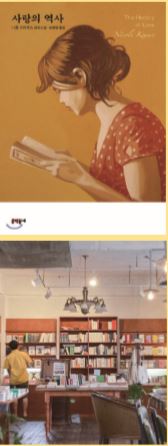
『The History of Love』 published in 2005, by Nicole Krauss.
A footstep creaking out from the wooden floor, harmonizing with the scent of old and new books can be found in this bookstore. Visitors come to look around some books, take some with them, have a little talk with a cup of coffee, or chat about their readings. The fountain pen and ink are laid on a desk below the windowsill. People can transcribe poems, and can also take others’ copies. When receiving the ordered drinks, together comes a paragraph of words within a paper. There are several book discussing classes operated in Kafka that anyone interested can join. You can certainly enjoy your own style of treating books here.
(Information)
Location : 2nd floor, 32, Pungnammun 4-gil, Wansan-gu, Jeonju-si, Jeollabuk-do
Operating Hours : 12:00 ~ 21:00, Wednesday to Sunday
Instagram : @bookstore_kafka / Facebook : kafka471
2) Way to Get Involved with Books: AKER bookstore
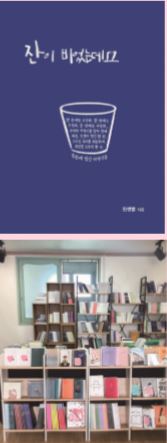
『My glass is empty』 published in 2020, by Jang Saetbyeol
When arriving here, red slippers warmly greet visitors as if visiting friend's house. In a small space, there are more than a thousand books of different genres, including poetry, essays, and picture books. Some books have brief introductions on a memo pad. If you worried about what to choose from loads of books, tell the owner some keywords that you are interested in. He will recommend the book only for you with a kind explanation about the author and the book. In the corner, there lie stickers and postcards that will remind that you visited here. Not being specialized in one genre, AKER bookstore offers wide range of books, so we recommend this place to people who have never met a number of independent bookstores.
(Information)
Location : 4th floor, , Jeollagamyeong 4-gil, Wansan-gu, Jeonju-si, Jeollabuk-do
Operating Hours : 13:00 ~ 19:00, Wednesday to Sunday
Instagram : @tuna_and_frogs
Website : https://smartstore.naver.com/tuna_and_frogs
3) Turn Pain into Art: Moolgyulseosa
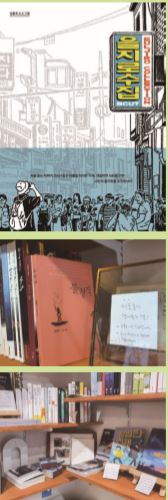
『Euljiro Sujip』 published in 2020, by Seol Dong-ju.
Seven artists from various genres gathered up at the red-light district. Writer, painters, videographer, vocalist, and photographer, all gathered to protect the bookstore each day of the week. Graphic novels and meaningful goods made by themselves decorate the first room of the place. If you walk through LPs and small paintings hung on the wall, old books are waiting for another owner at a low price. They believe anyone can 'own' books, and not only letter-written books are called books. This place is where all kinds of books become a passageway and connect different people. On some days, it becomes a playground for the elderly, and on others, small seminars are held. In the effort of Jeonju citizens, this district is being regenerated. This is not just a bookstore. It is a neighborhood filled with human warmth.
(Information)
Location : 693-6Beonji, Seonosong-dong, Wansan-gu, Jeonju-si, Jeollabuk-do
Operating Hours : 11:00~18:00 (Only closed on every Wednesdays)
Instagram : @mull296 / Facebook : mullwangmull
4) Dilute Congestion of Mind through Books: Peace or Peace
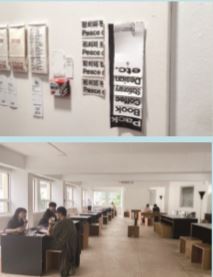
“Read whatever you want but focus on whatever you are reading.”
Everything feels peaceful here. Sixty books, which seem to be small for a bookstore, are exclaiming to concentrate on one book a week for a year. The curator brings books that are "attractive even after a long time of reading” because random texts sometimes could be a waste of paper and harm the environment. She seems to focus on the reader itself. This is why she doesn’t curate when there is no information about the clients. Scribbles and fingermarks are marked as memories and truthfulness of readers on almost every book in here. You can read any book in this space. This place, filled with the sound of typewriter tapping and smell of savory drinks, is peaceful.
(Information)
Location : 3rd floor, Pyeonghwawa Pyeonghwa, Jeollagamyeong4-gil 16-7, Jungang-dong, Wansan-gu, Jeonju-si, Jeollabuk-do
Operating Hours : 13:00~22:00 (Closed days each months are announced via Instagram)
Instagram : @peace.or.peace
Jeonju Reading Festival 2020
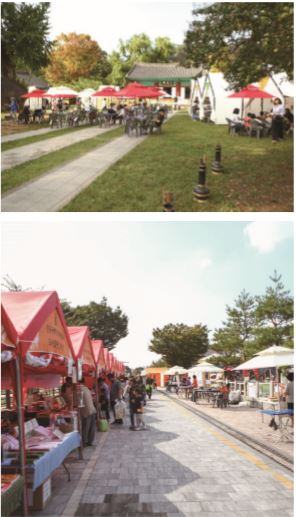
* Please be aware that there might be changes in this festival due to COVID-19.
A year ago, Jeonju Reading Festival 2019 was held for three days in autumn, taking place at Jeonju Hanbyuk Cultural Center, and NIHC (National Intangible Heritage Center), which are mainly located near Jeonju Hanok Village. Under the theme, “Write Yourself”, people in all ages could participate in various programs related to books. There were especially separated communicating programs for each age group: children, teenagers, and adults. Abundant book stories were provided with enthusiastic lectures by great writers and performers.
This year, bewaring COVID-19, Jeonju Reading Festival 2020 will be held on September 18 to 20. Local bookstores and Jeonju municipal libraries are holding a stamp event together, in order to encourage people to visit them and receive stamps. Those with more than 5 stamps will be awarded with eco-bags during the festival. More than twenty writers are participating in this festival, giving lectures at the auditorium in NIHC. There are several performances in and out of NIHC, and participating booths are operated during the three days. According to a Globe Reporter who participated in this festival last year, people might face trouble going there without any specific information. So be prepared beforehand, and plan your book tour elaborately in order to enjoy plentiful programs that are ready for everyone. More detailed information can be seen through homepage: /www.jjbook.kr/.
Check Out These Programs Held by Jeonju Municipal Library
‘The Reading Club’ is a program supported by Jeonju City to encourage reading activities of Jeonju citizens. The activity period is one year from January to December and the followings are provided. First, Jeonju City sends a ‘reading guide’. It guides the method of discussing about books, and provides know-how with the aim of the stable operation of reading clubs. In order to reduce the burden of purchasing books of reading club, they also support a loan service called ‘book package’ that allows users to borrow books they want from nearby libraries. In addition, space for reading discussion can be rented at the municipal library. Please visit the website for applications and more information.
(Information)
Website : https://lib.jeonju.go.kr/index.jeonju?menuCd=DOM_000000104001007000
‘The reading marathon’ is a program aiming to promote reading by combining it with the marathon. From elementary school students to all ages higher, Jeonju citizen can participate in this program as an individual or within a group. Applying the marathon was available since March and progress for seven months until September. Runners who write book report every day on the website receive medals and certificates of completion, and they can benefit from the priority to participate in lectures held at Jeonju Reading Festival 2020. Winners will be announced on the website of the reading marathon in October.
(Information)
Website : https://lib.jeonju.go.kr/marathon
Everyone has different reading styles. It also means that there are different preferences in places to read as well. Introducing these interesting places of libraries, independent bookstores, and festival venues, we have noticed that there are infinite sites that are suitable for reading and to become intimate with books in Jeonju. All of the mentioned spots were fresh, cozy, or interesting, so that it made us convinced that the readers of the JBNU Globe will be able to find their own favorite reading spots. The Globe reporters hope this article could be a guideline to those who are willing to read in this perfect season to take books.
Hong Sammy Editor, Gu Seo-yoon Reporter, Ku Halin Cub-Reporter

